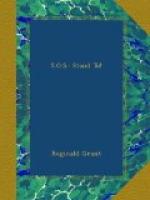Next afternoon, while resting in billets to where I had been ordered, a shell struck the building, a splinter knocking out the eye of Ed. Jackson, who was sitting beside me. He was not killed, but his wound was a blighty, taking him out of the game for good. The unwelcome visitors continuing to come, we were rushed to our battery of three guns in an orchard near by; a curtain of sandbags was placed in front to prevent the flash being seen. As soon as we started firing, rifle shots from our left scattered the mud on all sides, coming at intervals of five or ten minutes. Speculation was aroused and we set a man to watch, and suspicion fastened on a farmer who was working his plow. Nothing was found on him. Next day the same thing happened and again the watch was set. This time our efforts were rewarded; the scout saw the farmer shoot and throw the rifle down. He reported to the officer and we went over. The horny-handed son of toil was very busy at the plow as he saw us coming. He couldn’t speak English. The officer sent to the nearest French battery and presently a French soldier came who interpreted the officer’s questions and the man’s replies. He knew nothing, whatever, he said, about the rifle shots coming from his direction.
A search was then made for the rifle where the scout had seen him throw it and not only one rifle, but several, including English, French and German makes, were found in various parts of the field, partly buried in the soil. When the guns were discovered the farmer threw up his hands, wildly gesticulating and vehemently protesting that he knew nothing whatever as to how they came there. His was a short shrift. He was tried on the spot, tied to the pump of his own farm and shot.
CHAPTER III
YPRES
I remained in this spot with the guns until March, when the costly victory of Neuve Chapelle was fought. My battery was playing on their northern flank. The objective of the British Tommies was the city, which they took, but at a terrible toll; 6,000 Indian troops, mostly Ghurkas, were slain. The fearful mortality exacted from these troops was due to their impetuosity; they do not know fear; it was impossible to hold them; they rushed out before their time and some of them suffered from the fire of our own guns. It was in this fight that our own famous and gallant regiment, the “Princess Pats,” was decimated, sustaining a loss of over 700 men. This magnificent body of fellows went into the war 1,150 strong and at the last roll call but 22 of the original men answered. The price paid was too much for what was accomplished.
We were then ordered to billets and stayed there until April 20th, when we were ordered to Ypres, arriving there April 21. My battery was stationed at St. Julien, one and a half miles northwest of the city. Here I was detailed as observer, my duty being to get into the front-line trench and from the most advantageous nook that I could find, try to discover whatever I could about the movement of the enemy, communicate my knowledge to the telephonist who would in turn send it to headquarters.




